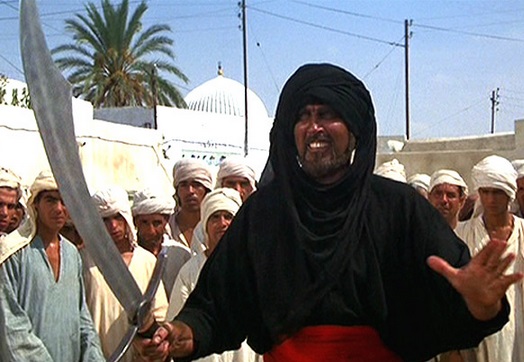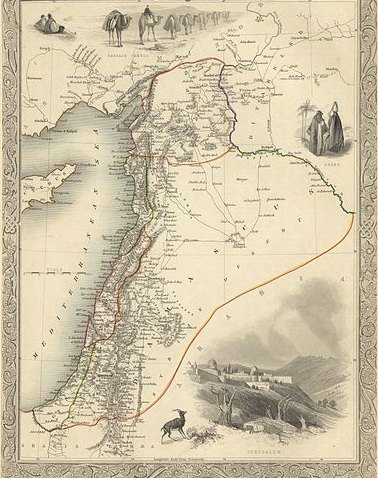  |
 |
 |
 |
|
MahdiWatch.org
|
 |
|
Home | About Me | Links to My Articles | Info on My Books | Contact Me
|
 |
|
Welcome to MahdiWatch.org! NEWSFLASH! COMMENTS LINK
BELOW EACH POST IS ENABLED! FEEL FREE TO BURY ME, PRAISE ME--OR JUST ISSUE A PERSONAL FATWA!
al-Mahdi is "the rightly-guided one" who, according to Islamic Hadiths (traditions),
will come before the end of time to make the entire world Muslim. Over the last 1400 years numerous claimants to the
mantle of the Mahdi have arisen in both Shi`i and Sunni circles. Modern belief in the coming of the Mahdi has
manifested most famously in the 1979 al-`Utaybi uprising of Sa`udi Arabia, and more recently in the ongoing
Mahdist movements (some violent) in Iraq, as well as in the frequently-expressed public prayers of former Iranian
President Ahmadinezhad bidding the Mahdi to return and, in the larger Sunni Islamic world, by claims that Usamah bin Ladin
might be the (occulted) Mahdi. Now in 2014 Mahdism is active in Syria, as the jihadist opposition group Jabhat al-Nusra
claims to be fighting to prepare the way for his coming; and in the new "Islamic State/caliphate" spanning
Syrian and Iraqi territory, as its leadership promotes the upcoming apocalyptic battle with the West at Dabiq, Syria. This site will track such Mahdi-related movements, aspirations, propaganda and beliefs in both Sunni and Shi`i
milieus, as well as other Muslim eschatological yearnings.
For a primer
on Mahdism, see my 2005 article, "What's Worse than Violent Jihadists?," at the History News Network: http://hnn.us/articles/13146.html; for more in-depth info, see the links here to my other writings, including my book on Mahdism.
|
|
|
|
Thursday, August 29, 2013
The Alawis of Syria and the (In)Advisability of US Intervention There
I have an article up today on certain aspects of the Syrian civil war situation that analysts and policy makers are missing
(or ignoring)--most notably, that the pseudo-Shi`i Alawis, as well as their Christian allies, fear being slaughtered by the
Salafi-jihadist groups such as Jabhat al-Nusra. The article is entitled " Reprehending Ignorance About Syria." 
Friday, August 2, 2013
Major Nidal Malik Hasan's Post-Jihad Islamist Manifesto
Yesterday (8.1.13) I was interviewed by
Catherine Herridge, Fox New Channel's intelligence and homeland security correspondent. The topic was Major Nidal Malik
Hasan, the Ft. Hood jihadist. He had just released six new pages of personal statements--four handwritten, two
typed--which FNC provided exclusively to me for analysis. Ms. Herridge's story is linked here, and contains two embedded links to Hasan's statements. My breakdown--in terms of Islamic origins and influences on
him--is below.

Dr. Timothy Furnish—assessment of Nidal Malik Hasan statements, 7.31.2013
I. Handwritten notes
P. 1: Hasan’s adducing of “the sovereignty of All-Mighty
God” over against “the sovereignty of man” is standard-issue Islamist thought, proximately traceable to
two famous 20th c. Islamic political theorists but ultimately deriving from Muhammad himself and the 1,400-year-old Islamic
understanding that religion and state are NOT separable. The modern theorists are Abu al-`Ala Mawdudi (d. 1979), the Pakistani Pan-Islamic thinker and Sayyid
Qutb (d. 1966), the Egyptian Muslim Brotherhood writer. Both (Mawdudi first) wrote about hakimiyah,
the “dominion” or “sovereignty” of Allah which can only be enacted when Islamic rule—via shari`ah—is
the law of the land and which is totally contraposed, and opposed, to Western democracy—which results in the evil sovereignty
of man, not Allah. Mawdudi greatly influenced Abdullah Azzam (d. 1989), who was the mentor of both Usama
bin Ladin (d. 2011) and Anwar al-Awlaki (d.2011)—Hasan’s Islamist teacher. Also, regarding Hasan’s reunciation of
any oath “made in the past [with those] that associate partners with All-Mighty God”—this is a reference
to the prohibitions, in both Qur’an and Hadiths (sayings attributed to Muhammad), which condemn shirk, “polytheism,”
and those who practice it, the mushrikun, “polytheists” or “idolaters”—specifically
Christians, whose Trinity is regarded by strict Qur’anic literalists as tantamount to polytheism. Hasan
thus views the US, and its military, as the abode of mushrikun.
P. 2: Hasan, again, follows standard Sunni Islamic teachings in making an invitation to his non-Muslim interlocutor(s)
to accept Islam. This follows a Hadith from Muslim b. al-Hajjaj (d. 875 AD) which recounts Muhammad giving
non-Muslims three options, once they have been offered conversion to Islam: 1) they convert, thus solving any problems; 2)
they refuse, but willingly submit to dhimmi status and pay the onerous jizya tax; 3) they refuse to convert
or submit—in which case they must be fought. Hasan obviously deemed the Ft. Hood community to have
chosen the third option.
P. 3: In response to the question asking him to respond to alleged charges from other Muslims that he had “broke[n]
[his]covenant (oath of office),” Hasan obviates and does not directly address the allegation. Instead,
he repeats rhetoric seemingly from the American Left (and extreme Libertarian Right) that “the wars in Afghanistan and
Iraq are illegal and go against the U.S. Constitution.” This question is a bit
curious, however, in Islamic terms because the Arabic term ba`yah—usually used for “pledge of allegiance”
to a ruler or religious leader—is distinct from the term for “covenant” or “truce.”
It is worthy of note, however, that in Islamic thought a ba`yah is only binding so long as the one to whom
fealty is pledged (again, whether political or religious) is following Islamic rubrics. In fact, according
to strict understanding of Islamic political thought going back over a millennium [as noted above] and re-invigorated in the
20th century, Hasan should never have pledged allegiance to the military forces of the kuffar (“unbelievers”)
power in the first place.
P. 4: Regarding Hasan’s relationship to the late Anwar al-Awlaki: he makes no bones about
the latter being his “teacher, mentor and friend.” Al-Awlaki’s views on jihad and non-believers—“never
trust a kuffar” and “the Prophet [sic] is the pinnacle of jihad”—are well-known; what is not well-known (or perhaps not admitted) is that such views
are neither novel nor, frankly, “extreme” in Islam. In fact, they are quite mainstream in Sunni
circles, among those who read the Qur’an literally. As noted earlier, al-Awlaki relied heavily on earlier, more scholarly Islamic ideologues such as Abdullah Azzam and Sayyid
Qutb, and his views obviously resonated with Hasan.
II. Typed statement, “Is Preferring an American Democracy Over Shari`h [sic] (Islamic Governance) Permissible?”
The
bulk of this statement consists of footnotes adducing Qur’anic passages. The actual text, such as
it is, is of a piece with Hasan’s handwritten missives and restates the points made therein that Allah’s sovereignty—Sayyid
Qutb’s aforementioned hakimiyah—is incompatible with democracy, not least because it separates church
and state (although Hasan should more properly have said, following his own logic, “mosque and state”).
His assertion in FN 1 (or i) that “the Qur’an makes…clear” the incompatibility of democracy and shari`ah puts Hasan squarely in the rejectionist wing of Islam (along with
the Taliban, Boko Haram, al-Qa`idah, etc.) over against both the Westernizers (such as the founder of modern Turkey, Kemal
Atatürk) and even “reformers” such as the Muslim Brotherhood.
I think the most salient footnote is Hasan’s 12, or xii (at the bottom of the second typed page), in which
he adduces two Hadiths prohibiting Muslims from befriending or living with, or among, the mushrikun and recommending
that, rather, they emigrate to a majority Muslim area. This reflects the ancient Islamic distinction—indeed,
dichotomy—between dar al-Islam, the “world” or “abode” of Islam,
and that of dar al-harb, the “world” of war—which should be fought until it submits.
Hasan, like al-Awlaki (and Qutb, and Azzam, and Khomeini, and Muhammad himself) does not ascribe to the concept, advanced
by some reformist Muslim thinkers, of a halfway house known as dar al-ahd (“land of truce”)
or dar al-sulh (“land of armistice”). One wonders why it took Hasan
decades to come to these viewpoints. However, I caution against the idea, popular in the media, of killers
like Hasan or the Tsarnaevs being “self-radicalized” or “radicalized by the Internet”
or, indeed, “radicalized” by any other human being. No amount of sermonizing, however
fiery, would motivate men to kill in the name of Islam unless there were some justification and rationale for jihad
(“holy war”) and qital (“killing”) in the Qur’an, Hadiths and Muhammad’s
example. In that sense, Hasan’s jihadist fire was lit by al-Awlaki—but the tinder had been
there for 1,400+ years.
As Bernard Lewis observes in The Political Language of islam (Chicago: University
of Chicago Press, 1988), p. 2. I insert the Latin emendation here, because I do not consider Muhammad a prophet, let
alone the “Prophet.” Again, noting error: the correct transliteration into English of the term is shari`ah.
Hasan, for all his vaunted Islamic dedication, does not know Arabic. A good delineation of the relevant Qur’anic verses is here.
|
|
|
|
| Jamkaran Mosque near Qom, Iran (during my trip there Aug. 2008) |
|
|
|
